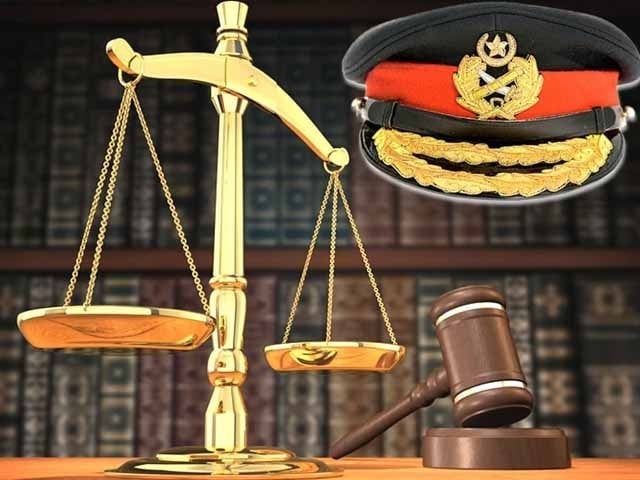- Web Desk
- Feb 19, 2026
Does army officer have enough experience to pronounce death penalty: Justice Mandokhail
-

- Web Desk
- Jan 10, 2025

ISLAMABAD: The Supreme Court’s Constitutional Bench resumed the hearing on civilian’s trial case in military courts. A seven-member constitutional bench headed by Justice Aminuddin Khan conducted the hearing.
Defense Ministry’s lawyer Khawaja Haris continued his arguments from yesterday. Justice Jamal Khan Mandokhail said, “Justify the trial procedure in military courts.” Justice Musarrat Hilali added to the question, highlighting that in the military courts, the officer who conducts the trial does not pronounce the verdict himself in the court. Rather, the officer conducting the trial sends the case to another senior officer, who pronounces the verdict. “How can an officer who has not heard the trial give a verdict?” she asked.
Also read: SC’s Constitutional Bench debates civilian trials in military courts
Justice Mandokhail said, “I have been in this field for 34 years but still I do not consider [an expert]. Does this army officer have enough experience and expertise that even death penalty is pronounced?”
Khawaja Haris replied, “I will explain the procedure of military trial in full in the second part of the arguments.”
Justice Naeem Akhtar Afghan then asked about the fundamental human rights as enshrined by Article 10A pertaining to a fair trial. “Tell us everything, what are the stages and how trials are being conducted in military courts,” he said, adding that everyone is under the impression that trials in military courts are not done like trials in civilian courts. “Give an example of a military court trial,” Justice Afghan said.
Justice Mandokhail said, “There is a difference between the Army Act and the rest of the law.” He said that the appeals against the decisions of military courts can be heard only to a certain extent. “Only malice and jurisdiction can be debated in an appeal against the decisions of military courts. Merits cannot be discussed in such an appeal,” he said.
To this Khawaja Haris replied that the decisions of military courts cannot be challenged even on the point of fundamental rights. Justice Mandokhail responded to lawyer Khawaja Haris that in this regard, the application of the Army Act should be curtailed instead of expanding it.
Our forces probably consist of more than seven hundred thousand people, Justice Mandokhail said, adding, “The question is also about the rights of these seven to eight hundred thousand soldiers. We are sitting here to give justice to all, ordinary citizens and soldiers as well.”
Those against whom a decision has been made in the army should also have the right to appeal in other courts, Justice Mandokhail said, adding, “If someone has been wrongly sentenced to death, why can’t anyone check it?”
“Can the Supreme Court reverse the decision?” Justice Hilali asked. She also posed the query about military courts in other countries, asking if the judge of such courts is a soldier or someone else.
Khawaja Haris responded that different cases have different procedures all over the world.
She then said that if a person attacks soldiers in Khyber Pakhtunkhwa and is caught alive, he is taken to a military court. However, the case of the hijacking of a plane with a general on board was heard in an Anti-Terrorism Court and eventually martial law was imposed in the country due to the same plane hijacking.
Khawaja Haris replied that airplane hijacking is not a crime listed in the Army Act.
Justice Hilali then asked that if a war plane or a military plane is hijacked, where will the trial for that take place, adding that if the plane hijacking case falls under the jurisdiction of the ATC, then so does the attack on government buildings.
The Defence Ministry’s counsel responded that the Army Act applies to those who violate the Official Secrets Act. “The Army Act does not apply to every terrorist,” he added.
The bench asked, “Did the military courts conduct the trial in the light of the cases that were registered? How can a military court proceed with cases under the Penal Code and Anti-Terrorism Act?” The bench also pointed out that the copies of the three FIRs that have been submitted do not contain the provisions of the Official Secrets Act.
Khawaja Haris responded that more provisions can be added after investigation, to which Justice Muhammad Ali Mazhar said that there is a separate procedure for adding more provisions. “Was reliance placed on the police investigation?” Justice Mazhar asked.
Also read: Military courts pardon 19 convicts linked to May 9 incidents
Khawaja Haris replied that when the accused goes to military custody, then the military’s own system of investigation is employed.
Additional Attorney General Aamir Rehman added that only three cases have been presented to the court, while in total, there are 35 FIRs of May 9 events about 5,000 accused. “Only 105 people whose presence was proven were tried in military courts,” he added.
The Constitutional Bench adjourned the hearing of case till Monday.




